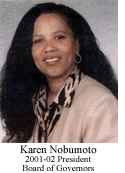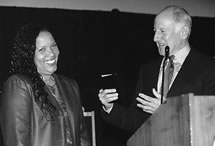

Ready for the challenges ahead
By KAREN NOBUMOTO In my swearing-in speech as the 77th State Bar president, on Sept. 8, 2001, I pledged to form a partnership with you to move our bar and our profession forward. Little did we know then how our nation would change in just a few days and how we, as family members, as lawyers, as Americans, would respond to the tremendous challenges our country now faced. In the ensuing 13 months, we have all changed in some way. Perhaps the change that I have seen most is the renewed passion and commitment so many have devoted to improving our profession, to protecting the public, to assisting those in our society who are underserved and overlooked. We have helped many Americans put their lives back together, and at the same time we have tackled some of the most difficult challenges in our profession. I made a commitment last year that working together, we would tackle the overwhelming problem of unauthorized practice of law. On the legislative front, Sen. Gloria Romero responded to that call by introducing and championing SB 1459, which provides that UPL by non-lawyers is now punishable by up to one year in county jail or a $1,000 fine, or both. Sen. Romero's successful bill also provides that subsequent UPL convictions require a minimum 90-day jail sentence and that the court state on the record the reasons for any lesser sentence. UPL has been a primary concern of many in the bar for a long time, especially those who have seen the harm to seniors and to the immigrant communities, where unsuspecting individuals hire non-lawyers to handle their legal affairs. We salute Sen. Romero for championing our cause and were especially pleased to have had her appear at our final board meeting of the year this September, along with my boss, LA District Attorney Steve Cooley, long a supporter of enhanced UPL penalties, to commemorate the approval of these much needed tougher sanctions. In another successful legislative collaboration, we launched in January the Lawyer Assistance Program, the drug diversion program first conceived by Sen. John Burton and approved by the legislature last year. With minimal outreach, the LAP enrolled more than 50 lawyers by early summer. Funded with $10 from every active lawyer's dues, the program is designed to help our members who have a substance abuse problem with either alcohol or drugs to get assistance before they violate ethics or professional rules and face bar discipline. Within the State Bar itself, the board approved a new governance structure and developed a long-range strategic plan. These changes enabled the board to look far beyond any given moment on any issue. And with this structure in place, we undertook a full fiscal review, examining every line item in our budget, justifying worthwhile programs and expenses and eliminating those that we felt were not a good use of members' dues. As a result, we were able to keep our 2003 dues to $390, the same as this year and $88 less than the all-time high in the mid- to late-1990s. Dues are actually lower now than in 1990, even though the cost of living has risen in every year and our budgetary expenses have continued to rise. We can attribute this fiscal efficiency to our new governance procedures, in which fiscal, legislative and operational concerns are now jointly taken into account, and each issue is fully vetted within committees and by the full board, leading us to our ultimate goal: to be more efficient for, and accountable to, our members. Also in member relations, this board has taken very seriously its pledge to listen to the lawyers of the state by reinstituting meetings in every State Bar district. In the past year, I personally have traveled up and down California, visiting every district on multiple occasions. My colleagues on the board also have attended these district meetings. This has opened a new era in State Bar dialogue, with more give-and-take on many issues important to our profession.
We also have expanded our dialogue with the Supreme Court and the Administrative Office of the Courts into a meaningful partnership in tackling some of the most serious concerns facing the citizens of our state. Chief Justice Ronald George has been a champion in promoting legal services throughout California and helping the State Bar and the California Commission on Access to Justice reach out to those who have been underserved in the area of legal services. The Chief Justice also has appointed a blue-ribbon committee to review the ABA's report on our discipline system and to further ensure that the public benefits from the best possible protection from those lawyers in our ranks who violate their ethical and professional responsibilities. We applaud the efforts of the Chief Justice and look forward to the anticipated recommendations that will improve the administration of our discipline system. On another front, through a series of frank and productive working sessions, the Conference of Delegates Task Force, first announced at the 2001 Annual Meeting, has resulted in a new and more appropriate relationship between the bar and the conference. Just a few weeks ago, the board approved a legal separation, enabling the conference to reconstitute itself as a 501(c)(6) non-profit trade association. This new independent entity will continue to debate issues of concern to the legal profession and the administration of justice in California. All involved view this as a move that will benefit both groups and further their mutual goal of an equal, fair and accessible justice system. The new independent conference will continue to meet at the State Bar's Annual Meeting, and the bar will continue to collect voluntary contributions for the conference on its annual fee bill on a contractual basis. This new relationship addresses the concerns of those who have criticized the previous relationship and will allow both groups to move forward for the benefit of all Californians. Perhaps one of our finest achievements of this past year was bringing together diverse people in our profession from literally all over the world. Our 2002 Midyear Meeting in Sonoma, which featured national and international speakers, was so successful that we envision similar undertakings in our future. We also welcomed the ABA's "Investing in Diversity, Investing in Ourselves" conference to San Francisco this spring and will be holding our first Access & Fairness Summit, "Celebrating Diversity in the Profession," and presenting our first State Bar Diversity Awards at the Annual Meeting in Monterey this month. We started our State Bar year last September with the results of the first demographic survey conducted in a decade. That survey found that the minority representation of our state is just 17 percent; that women represent 32 percent. In this year we have most likely not boosted those numbers much, but we have definitely set in place a support mechanism and a long-term structure that will help make our bar more open to people of all backgrounds. In so doing, we have developed a new definition of access: one that includes not only the public in terms of legal services, but our own members and potential future members in terms of ethnicity, gender, sexual orientation, physical capability and age. As your president, last year I sought to do my part to help solidify our future as an integrated bar. Through our governance restructuring, our successful campaign for increased penalties for UPL, the launch of our Lawyers Assistance Program, enhanced member outreach, our leaner budget, our hard work to develop an independent conference, our productive association with the Chief Justice and the courts, and our expanded efforts to increase diversity in our profession, I believe we have begun to build a solid foundation for the bar's future. By joining forces, working together, and listening to one another, we have truly set in motion a modernized bar that is equipped to meet the challenges that lay ahead. Thank you for the opportunity to serve as your president. I have appreciated all of your input and hard work and will cherish this year of service to a profession that I believe exemplifies what is best - and great - in America. |
||||||||
|
||||||||

